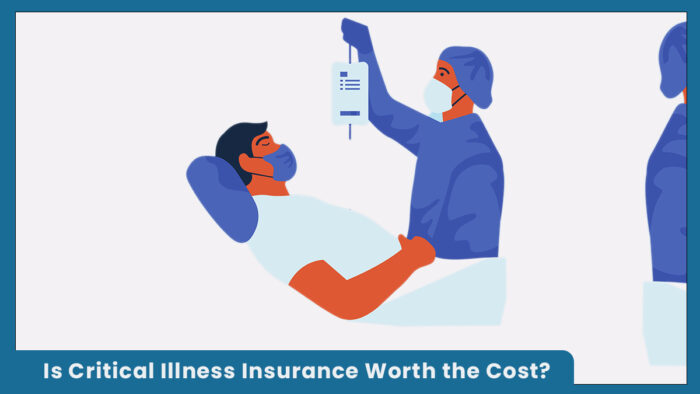Is Critical Illness Insurance Worth the Cost? Many people are caught off guard when they realize their regular health insurance doesn’t cover every medical cost. That is where critical illness insurance comes in. It helps fill the gap by offering extra financial support during a serious illness.

This type of insurance pays out a lump sum if you are diagnosed with a major health condition. While the exact list of illnesses can vary, it often includes heart attacks, strokes, cancer, and sometimes organ or kidney failure.
Meabwhile, you are free to use the money however it helps you most. Some use it to cover everyday expenses, medical bills, or rehabilitation costs. Others use it for home care, child care, or even wellness programs that support recovery. The goal is to ease financial stress so you can focus on getting better.
How Does Critical Illness Insurance Help Strengthen Your Financial Plan
Critical illness insurance can help protect your savings when unexpected health issues arise. Instead of pulling from your emergency fund or personal savings, this type of cover can step in to ease the burden of high medical costs. For instance, if your health plan comes with a $7,500 deductible, having a critical illness policy for that same amount can help cover it.
A key advantage of critical illness insurance is that the payout is often made quickly. Unlike long-term disability insurance, which may require a waiting period of several months, critical illness benefits are usually available soon after a diagnosis.
That said, it’s important to know the limits. The policy only pays if the illness meets specific criteria, and it does not cover pre-existing conditions. This means it’s best to apply before any major health issues arise.
The Cost of Critical Illness Insurance
Several factors influence the cost of critical illness insurance, including how much coverage you choose, your age, health, gender, whether you use nicotine, and how you purchase the policy.
Generally, younger and healthier individuals with no existing health issues tend to pay lower premiums, especially when buying coverage directly from an insurer.
For example, a 30-year-old nonsmoker may qualify for employer-sponsored critical illness insurance from Protective at around $1.64 per month for every $5,000 in coverage. That adds up to about $8 each month for a $25,000 policy. For a 40-year-old, the same coverage could cost about $12 per month, while a 50-year-old may pay closer to $19.
Who Needs Critical Illness Insurance
Critical illness insurance can offer valuable financial support for people who may not qualify for traditional disability insurance. This includes individuals such as stay-at-home parents, freelancers, and part-time workers who may face financial pressure if they are unable to work due to illness.
It can also be a practical option for those with a family history of serious medical conditions, such as heart disease, who want added protection in place. For others, it may make more sense to invest in a different type of coverage, like increasing the value of an existing life insurance policy. The right choice often depends on your personal situation and financial goals.
What Does Critical Illness Insurance Typically Covers
Critical illness insurance provides coverage for specific health conditions listed in your policy, and these conditions can vary depending on the provider. Common illnesses often included are:
- End-stage kidney failure
- Certain types of cancer, especially when considered life-threatening
- Heart attack
- Major organ transplant
- Multiple sclerosis
- Parkinson’s disease
- Stroke
Some plans may also include conditions such as Amyotrophic Lateral Sclerosis (ALS) or permanent hearing loss, but not all policies offer these benefits.
Does It Cover Pre-Existing Conditions?
In most cases, critical illness insurance will not cover any condition you were diagnosed with before purchasing the policy. For example, if you are diagnosed with a disease before getting coverage and later require bypass surgery, the plan may not pay out since the diagnosis occurred prior to enrollment.
Does Critical Illness Insurance Comes with Life Insurance Automatically?
If you are shopping for term life insurance, you may find that some providers include a critical illness rider at no extra cost. For permanent life insurance plans, this rider is usually available for an added fee, but it often costs less than purchasing a separate critical illness policy. Just like a standalone policy, a rider pays a lump sum if you are diagnosed with a covered condition. The payout is tax-free, and you can use the money however you need from medical costs to everyday living expenses. The exact amount you receive will be stated clearly in your policy.
There is one trade-off. If the rider is used during your lifetime, the amount paid out will be deducted from the life insurance benefit your beneficiaries receive later on. For instance, if your life insurance policy is worth $500,000 and you use a $50,000 rider benefit after a serious diagnosis, your beneficiaries would receive $450,000 when the policy is paid out. If you never claim the rider, your loved ones will receive the full $500,000. It’s important to note that riders like this can only be added to new policies, not existing ones.
Bottomline on Is Critical Illness Insurance Worth the Cost?
Yes, if you have the financial cappacity to add critical illness insurance to your policy, it is a great decision to make. This is because critical illness insurance is worth the cost and can help cover a lot of expenses when you are faced with critical health issues.
Should I Pay for Critical Illness Insurance?
Yes, if you want financial support in case of a serious illness and do not have enough savings or income protection.
What Are the Disadvantages of Critical Illness Insurance?
It may not cover all illnesses, excludes pre-existing conditions, and can get expensive as you age.
What Is a Good Amount of Critical Illness Cover?
It is enough to cover your living expenses, debts, and medical costs. Typically between $20,000 and $50,000.
At What Age Should I Get Critical Illness Insurance?
In your 20s or 30s, when premiums are lower and you are more likely to qualify for coverage.



